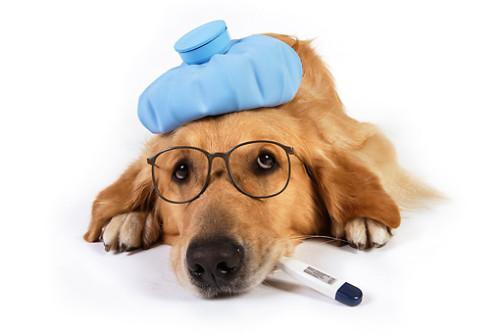
Canine Influenza Virus (H3N2 & H3N8)
We want to always keep our pet owners educated on the latest topics affecting veterinary medicine. Lately there have been several news stories addressing the recent Canine Influenza Virus (CIV) cases. Although at this time there are no confirmed reports of CIV in Oklahoma, it is something that you need to be made aware of.
What is Canine Influenza Virus?
The H3N8 strain of canine influenza was first identified in 2004 in Florida. The Canine Influenza H3N2 strain was first identified in Chicago in 2015. There have been recent outbreaks in several states. Canine influenza is highly contagious and is spread from dog to dog with direct contact, nasal secretions (barking or coughing), contaminated objects (kennel surfaces, food and water bowls, collars and leashes), and by people moving between infected and uninfected dogs. Dogs of any breed, age, or sex can be susceptible to infection. Infection with Canine Influenza can occur year-round. There have been no cases of transmission to humans.
What are the symptoms of Influenza?
The incubation period for the virus is 2-4 days, so dogs may become infected and not show signs for several days. During this incubation time the dogs will be shedding the virus while showing no symptoms. Symptoms can mimic Kennel Cough, as they develop a persistent cough. Dogs infected with CIV will exhibit upper respiratory signs such as: coughing, nasal discharge, ocular discharge, fever, and lethargy. CIV is highly contagious and most dogs that are exposed will become infected. Eighty percent will exhibit the above mentioned symptoms and clear the illness. In some patients the dogs may develop a secondary bacterial infection that can lead to pneumonia. All dogs infected with CIV are contagious for 30 days after exhibiting symptoms.
What can be done to prevent my dogs from becoming infected with CIV?
There is a vaccination that is available. Both strains of CIV are covered in this vaccination. This vaccination is not considered a core vaccination but is recommended if your pet is frequently in boarding facilities, at dog parks, and attending dog shows or other social canine events. We currently have this vaccination available at our clinic. One of our veterinarians would be happy to consult with you and discuss if this vaccination is needed for your pet. The vaccination is simple and quick, but it must be boostered in one month for your pet to obtain adequate immunity. After the initial two vaccinations, dogs will need an annual booster.
Should I be concerned about boarding my dog with this virus around?
Any pet that is in public areas where there are large concentrations of dogs can be at risk for developing CIV or Kennel Cough. We recommend any dog that is being groomed, boarded, or attending training classes to be vaccinated for Bordetella Bronchiseptica (Kennel Cough) annually. Make sure you as an owner use good handwashing and cleaning of kennel items after exposure to other pets. In the future a CIV vaccination may be required for boarding facilities; however, at this time we are considering each case on an individual basis for vaccination. If you are returning from a show or other venue be aware that the virus can live on objects for 48 hours. The virus is inactivated by most disinfectants so following a good cleaning protocol is the key to preventing the spread of this virus.
My dog is coughing, does my dog have CIV?
Since symptoms of CIV are very similar to Kennel Cough, it can be difficult to distinguish. There are laboratory tests available to distinguish the two Canine Influenza viruses. If your pet is coughing the best thing you can do is call to schedule an appointment and make sure to inform our staff that your dog is coughing. After a thorough exam your veterinarian will then be able to give you further information, treatment and/or additional diagnostic options.
If you have any questions about Canine Influenza or would like to schedule an appointment to have your dog vaccinated today, please call our office at 405-340-1020.
